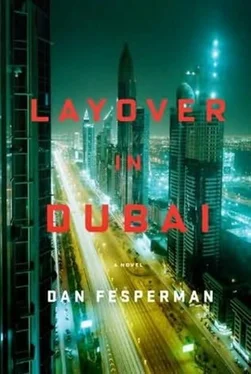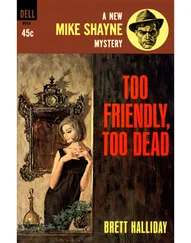A rough list of tasks began taking shape in his head, and Sharaf experienced a palpable sensation of his mind snapping back into place, like a dislocated shoulder into its socket. His head seemed to be clearing by the second. Or so he thought until he tried to get out of bed. Immediately wobbly, he sat on the edge while he waited for the skewed room to go level.
“Sharaf, please!”
The Minister reached out to steady him, although his touch was tentative, uncertain. You could sense he dreaded the idea of having to pick Sharaf up off the floor. As generous as the man had been so far, he obviously drew the line at physical contact. Maybe he saw Sharaf’s ilk-a cop on a beat, when you got down to it-as beneath him. A subcaste of manual laborer, practically untouchable. Or maybe Sharaf was just dizzy.
He collected his wits as best he could and turned his attention to immediate priorities. First he would call Amina and Laleh. Then Ali, for a discreet update on Keller, provided one was available.
“I need to use your phone.”
“Your own phone is here.” He gestured toward the nightstand. “The prison gave me your belongings. The police said your car has been returned to your home.”
Sharaf’s phone was in a tidy pile along with his keys and wallet. His police uniform, which he had been wearing when he was arrested at the Seaman’s Majlis, was folded neatly on a console table at the foot of the bed. His boots were on the floor below.
He reached slowly for the phone, trying not to set off a new round of spinning. In doing so he realized that a folded sheet of paper was poking from the edge of his wallet. Someone had stuffed it in there with his cash. His curiosity got the best of him, and he took it out.
It was a handwritten note. He read it while the Minister watched with apparent interest.
“What is it, Sharaf?”
“A grocery list, from Amina. I’d forgotten it was there.”
He waved it quickly so the Minister wouldn’t see the writing, then folded it away before the lie became apparent. It was actually an address, scribbled in pencil. A location in Deira, just across the creek from where he had grown up. Below it was a message: “After we saw what happened to you, Khalifa and I decided you must be telling the truth. Good luck, inshallah. Nabil.”
“Inshallah” was underlined twice, a parting joke from Nabil, who must have bribed a guard to put the note with his belongings. Now he knew where to find the elusive Rajpal Patel, assuming Assad hadn’t beaten him to it.
“A grocery list?” the Minister said. “Are you sure that’s all it was?”
“Unless you know some other coded meaning for bananas, bread, and coffee.”
The Minister seemed on the verge of questioning him further when Sharaf’s cell phone bounded to the rescue, ringing loudly. Sharaf snatched it up so quickly that his head spun again. He paused to let things drop back into place before answering.
“Sharaf.”
“You’re up!”
It was Ali. Unfortunately the Minister didn’t seem inclined to leave the room anytime soon. Sharaf would have to guard his words, not an easy task in his current state of mind.
“Yes. I am sitting here with the Minister.”
“I see. But my news can’t wait. I’m afraid something has happened to Keller.”
“What, exactly?” Sharaf glanced at the Minister. He pointed at the phone and mouthed the name, “Ali al-Futtaim,” then smiled quickly, as if to say everything was just fine. The Minister nodded, but didn’t budge.
“Are you at liberty to talk about this now, Sharaf?”
“Maybe you’d better come and get me. I am at the Minister’s house.”
“Twenty minutes.”
“Excellent.”
He hung up, wondering what could have happened. Ali hadn’t sounded happy.
“Surely you’re not leaving?” the Minister said. “Not in your condition. It is imperative that my doctor must approve. He can be here in thirty minutes.”
“I’ll be gone in twenty.” Sharaf reached for his clothes. He wasn’t going to change back into uniform, not for the work he had in mind, but he would take it with him. “Have him phone me. You’ve got my number.”
“Look at you, you’re unsteady. It’s too soon. Lie back down.”
The Minister held out his hands, as if to insist, but he didn’t touch Sharaf.
“Really, sir. I’m fine.”
“Then in that case I suppose you’re strong enough for new marching orders.”
“New?”
“‘Amended’ is probably a better word. Things have changed.”
“Changed how? I thought you had backing from the palace?”
“I do.” The Minister seemed mildly affronted that Sharaf had even questioned his clout. “But certain, well, pressures are being applied. From other quarters that can’t be ignored. The American embassy, for one.”
“What sort of pressures?”
“I want you to hold off on things for a while. At least until the whereabouts of this Keller fellow are established. You look awful, you know. Let me get you a glass of water.”
The water helped. So did a wedge of bread smothered with honey. Maybe all Sharaf needed was food. Whatever the case, he was steadier by the time Ali’s black Mercedes pulled up the curving stone drive, weaving among four liveried servants who were at work on the Minister’s lawn.
“I still say you should wait here for my doctor.”
“Look at it this way, Minister. The sooner I’m back at work, the sooner we’ll find out something about the missing American, so that I can resume my investigation. And I thank you. You have been most generous and compassionate.”
“It was the least I could offer, since you are working at my behest.”
“I’m grateful you still see it that way. And as long as that’s the case, could I ask one additional small favor?”
The Minister didn’t look thrilled, but he didn’t say no.
“There was an Emirati in my cell, a fellow named Nabil. He and his cousin Khalifa were jailed unjustly. Lieutenant Assad’s doing, I suspect, so perhaps you could intervene on their behalf. Also, if you can quietly ensure that someone seizes the cellblock video surveillance recordings from last night, then I’m certain you and the rest of the royal cabinet will find the contents quite revealing. Let’s just say that the prison is not being run in a manner worthy of Sheikh Mohammed. And with a few nimble moves you, not the ministers of justice or of interior, will be able to claim the privilege of being the one who set things aright.”
This prospect seemed to brighten the Minister’s mood, enough so that Sharaf was able to depart with his reluctant blessing.
Sharaf settled with gratitude into the leather upholstery of Ali’s Mercedes. By the time they were pulling onto the street he was feeling almost normal, and for the first time in days he allowed himself a fleeting moment of optimism. Time was tight, but perhaps his enemies were growing rushed, careless. He might yet have a chance.
Then Ali told him what had happened to Keller, making Sharaf wished he had simply stayed in bed.
A few hours earlier, a Frenchman, a Belgian, and an Emirati in a white kandoura stood in an office frowning over the body of Sam Keller, a death watch of tame-looking strangers.
“What do you think?” the Emirati asked in English.
“I think you killed him,” the Frenchman said.
“Don’t say that! Besides, I’m not even sure it’s possible.”
“With halothane? Of course it’s possible. How much did you use?”
Laleh interrupted from across the room.
“Stop it! You’re only making it worse. Have you checked his pulse lately?”
The Emirati, apparently designated to handle the medical side of whatever it was they were up to, lifted a wrist and glanced at his watch-a huge Audemars Piguet.
Читать дальше












